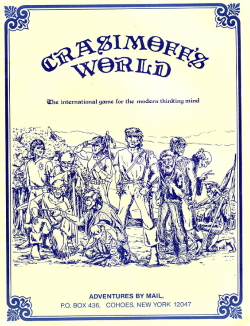Related Research Articles

A play-by-mail game is a game played through postal mail, email or other digital media. Correspondence chess and Go were among the first PBM games. Diplomacy has been played by mail since 1963, introducing a multi-player aspect to PBM games. Flying Buffalo Inc. pioneered the first commercially available PBM game in 1970. A small number of PBM companies followed in the 1970s, with an explosion of hundreds of startup PBM companies in the 1980s at the peak of PBM gaming popularity, many of them small hobby companies—more than 90 percent of which eventually folded. A number of independent PBM magazines also started in the 1980s, including The Nuts & Bolts of PBM, Gaming Universal, Paper Mayhem and Flagship. These magazines eventually went out of print, replaced in the 21st century by the online PBM journal Suspense and Decision.
Starweb is a closed-end, space-based, play-by-mail (PBM) game. First published by Flying Buffalo Inc. in 1976, it was the company's second PBM game after Nuclear Destruction, the game that started the PBM industry in 1970. Players today can choose a postal mail or email format. Fifteen players per game assume one of six available roles and explore and conquer planets within a universe comprising 225 worlds. The object of the game is to attain a predetermined number of points which are generated by various actions during gameplay. Multiple game variants are available. Starweb is still available for play as of 2021 through the company Rick Loomis PBM Games.
Alamaze is a computer-moderated, fantasy, turn-based game. It was published in 1986 by Pegasus Productions as a play-by-mail game. Reality Simulations later took over game moderation. The game itself has been played with multiple versions. The initial design, released in 1986, was replaced by the "Second Cycle" in 1991, offering changes to the kingdoms and game's history. The 3rd Cycle—"The Choosing"—emerged in 2015, doubling the available kingdoms while providing modifications to them. The publisher made additional changes to the player–game interface by 2017. In February 2019, Alamaze.co published the 4th Cycle, the world of Maelstrom, after two years of development. The game is currently run by Alamaze.co as a closed-end, play-by-email (PBEM) game in a turn-based format.
Starmaster is a computer-moderated play-by-mail game that was published and administered by Schubel & Son.
The Tribes of Crane is a play-by-mail game that was published by Schubel & Son. According to Jim Townsend, the game was launched in "roughly" 1976.
Universe II is a computer-moderated, science fiction, play-by-mail game designed by Jon Clemens and published by Clemens and Associates, Inc. in 1979.

Empyrean Challenge is a strategic science fiction play-by-mail (PBM) game. Published by Superior Simulations in 1978, its introduction was important to the nascent PBM industry. 150 players per game strove to dominate a cluster of star systems. Diplomacy, combat, economics, technological development, colonization, and other factors were important aspects of gameplay. Detailed work was required in all aspects of the game, requiring a significant investment in time for players. Reviewer Jim Townsend stated in 1988 that Empyrean Challenge was "the most complex game system on Earth".
Pellic Quest was a computer-moderated science fiction play-by-mail (PBM) game appearing as early as 1978. Conflict Interaction Associates published it as a spinoff of Flying Buffalo's game Starweb. In the game, 10–15 players competed to dominate a universe strewn with artifacts left by a super-race, the Pellics. Players role-played one of six character types with options to develop their position, expand through conquest, conduct diplomacy, and other actions. The game received generally positive reviews in gaming magazines in the late 1970s and early 1980s. The publisher appeared to close the game by 1988.
Starlord is an open-ended, computer moderated, space-based play-by-mail game. Designed and moderated by Mike Singleton, gameplay began initially in the United Kingdom, with Flying Buffalo launching a version in the United States in 1983. Gameplay was limited to 50 players roleplaying as Starlords with the goal of becoming emperor by conquering the Throne Star. Starlord was reviewed multiple times in magazines such as Dragon and The Space Gamer in the early 1980s, receiving generally positive reviews, with one reviewer noting the possibility of the game lasting for years.

Heroic Fantasy is a computer-moderated, dungeon crawl play-by-mail game. It has been active since 1982 when it was published by Flying Buffalo. The initial edition involved nine dungeon levels. Flying Buffalo published subsequent editions due to challenging gameplay initially, eventually limiting the game to four dungeon levels with a fifth outdoors level where players can assemble an army and capture one or more castles. The game is open-ended; gameplay continues until players decide to stop.
Quest of the Great Jewels is a closed-end, computer moderated, play-by-email game. It was initially published and moderated by Zorph Enterprises in the early 1980s. The game was created by Mike Shefler.
Illuminati is a computer-moderated play-by-mail game published by Flying Buffalo Inc. It is based on the Illuminati card game by Steve Jackson Games. It was originally owned by Adventure Systems but transitioned to Flying Buffalo Inc in 1986. The game's central focus is on conspiracy and intrigue and involved 24 players playing either by email or by mail in turns processed simultaneously by computer. Illuminati has won the Origins Award for Best Play-By-Mail Game seven times, once in 1985 and six times in the 1990s, and was inducted into the Origins Hall of Fame in 1997.
Midgard is an open-end, medieval fantasy play-by-mail game. It was published in 1984 by Time Space Simulations. Through 1996, the game passed through more than four different publishers, including Midgard USA. As of 2022, Talisman Games is the publisher. At initial publication, Midgard was computer moderated with partial human moderation.
Paper Mayhem is an out-of-print play-by-mail (PBM) game magazine that was published in Ottawa, Illinois. The staff published the initial issue in July 1983 and the magazine ran until mid-1998. Its format was 40 pages published six times per year. The magazine was the most well-known of the play-by-mail periodicals of the period, providing articles and reviews of play-by-mail games, as well as reader-informed ratings of play-by-mail companies, game masters (GMs) and games, both intermittently and on an annual basis. The magazine, along with its long-time editor-in-chief, David Webber, was influential in the play-by-mail community, even echoing into 21st century play-by-mail activities. The publication ceased suddenly in mid-1998 following the unexpected death of Webber.
CTF 2187 is a closed-end, computer-moderated, play-by-mail (PBM) game that was published by Advanced Gaming Enterprises in the 1980s. It involved teams of robots, of varying size and capabilities, battling on a hex-grid arena with the purpose of defeating the opposing team or their command post. Players assumed the role of a battle robot pilot. The game was tactically-focused, with combat action beginning on the first turn. Games lasted 5–10 turns, or about six months. Players began at the rank of cadet but could spend experience points earned from a completed game to increase in rank for future games, up to the rank of General.
Beyond the Stellar Empire is a play-by-email (PBM) game. Originally published by Adventures By Mail, BSE was an open-ended "space opera" with a single available game that began in playtesting in 1981. According to Stephen Marte, during the mid-1980s, like "Tribes of Crane and Midgard, BSE [was] the stomping ground of many of PBM's best power gamers". The game had two variants, one monitored by Game Masters who imposed artificial constraints, and another without constraints. Gameplay took place on a vast space stage where mega-corporations formed the dominant organizing framework, alongside various other groups that players could join to pursue tasks to advance, collaborate with other players, and progress to more senior positions such as space colony governors. Beyond the Stellar Empire placed #5 and #11 for Best PBM Game of the Year in 1987 and 1988, respectively, in Paper Mayhem, a magazine for play-by-mail games. In subsequent years, the game did not score well in Paper Mayhem reader ratings for playability, use, and product understanding. Beyond the Stellar Empire: The New System won the Origins Award for Best New Play-By-Mail Game of 1989.
It's a Crime is a play-by-mail (PBM) game initially published by Adventures By Mail in September 1985. On publication, it was an introductory PBM game that took place in New York City in the 1990s where players attempted to raise a gang leader to the position of Godfather. During its initial decade, gameplay was technically simple at the outset, but added additional possible turn orders if players progressed to higher levels such as "mob boss". The coordination and diplomacy among players added additional complexity to the game. The game won the Origins Award in 1986 for the Best New Play-By-Mail Game of 1986 and a second Origins Award for Best Play-by-Mail Game of 1989.

Crasimoff's World is a play-by-mail (PBM) game that was first developed by Kevin Cropper in 1980. It is regarded as the first fantasy role-playing PBM game.

Galac-Tac is a closed-end, science fiction, play-by-mail (PBM) wargame. It was first published by Phoenix Publications in 1982. By 1990, the publisher had changed its name to Delta Games, and then later to Talisman Games. In 2010, Talisman Games changed ownership and transitioned Galac-Tac to a web-based game. It is still available for play by postal mail or email for those with web access challenges. The game has been updated as well as reviewed multiple times in its 40 years of active play. Various reviews in the 1980s and 1990s provided both positive and negative comments as well as potential areas for the game to improve. The game has been featured numerous times in the modern PBM magazine, Suspense & Decision.

Quest is an open-end, fantasy, play-by-mail (PBM) role-playing game. Initially released in the United Kingdom in 1991, by Adventures by Mail, it later became available for play in the United States, Australia, and other countries in Europe. The game has a First and Second Age, initially comprising about twenty worlds of up to 1,000 parties controlled by players. After the year 2000, the worlds consolidated into four. The current publisher is KJC Games.